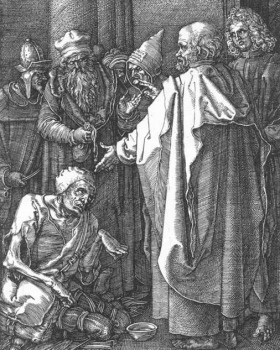3John does not have any direct quotes from the Old Testament like several other New Testament writings. It also does not discuss doctrine.
3John is one of only five Biblical books, the others being Obadiah, 2John, 3John, Philemon and Jude, which contain only one chapter.
3John is not only the shortest book in the New Testament, with only 294 words in the King James, it is also the briefest in the entire Bible!
3John is, however, only the second smallest in terms of verses, as its 14 verses is one more than 2John which has only 13. The shortest Old Testament writing is Obadiah with 21 verses and 669 words in the KJV.
It's All in the Name
Diotrephes' name (3John 1:9) means "nourished by Jove" (Thayer's Greek Definitions #G1361). Jove is another name for Jupiter, the pagan god of the sky and thunder that was also considered the king of the gods in ancient Roman mythology.
[Qualities of a True Christian Leader]
Demetrius' name (3John 1:12) means "belonging to Ceres" (Thayer's Greek Definitions #G1216). Ceres was the pagan goddess of agriculture, fertility, grain crops, the harvest and motherhood in the ancient Roman religion.

3John is one of John's four writings, the others being his gospel and 1 and 2 John, which do not record his name. The book of Revelation, however, mentions him by name five times (Revelation 1:1, 4, 9, 21:2 and 22:8).
[Number Seven and Worship of God]
A total of seventeen Biblical books are distinguished by a number in its name. Eight of these books begin with the number one (e.g. 1Chronicles). Another eight start with the number two (e.g. 2Corinthians). Only one, 3John, starts with the number three.
Repeater
The Apostle John uses the word truth six times in his short epistle (3John 1:1, 3, 4, 8 and 12). He also uses beloved, or a variation thereof, four times (3John 1, 2, 5, 11).
Greetings
About 78%, or 21 of 27 New Testament writings, are letters either to one of more groups of Christians (e.g. those living in Rome) or to individuals (e.g. Philemon) or to believers in general (Hebrews). The majority of these books open with a greeting wishing their readers grace, peace and sometimes mercy.
To Timothy, my dearly beloved son: Grace, mercy, and peace, from God the Father and Christ Jesus our Lord (2Timothy 1:2).
3John, however, does not have a greeting wishing such blessings from God the Father and Jesus.
The elder unto the wellbeloved Gaius, whom I love in the truth (3John 1:1).
3John is not alone in lacking a greeting wishing blessings from the Godhead. The books of James, 1Peter, 1John, and Hebrews also lack such an opening.
Amen
The English word Amen is recorded 78 times in 72 King James Bible verses. Both the Hebrew and Greek words from which it is derived (Strong's Concordance #H543, #G281) mean "so be it," truly, or verily. About 89%, or 24 out of 27 New Testament books, use the word in their closings.
And there are also many other things which Jesus did, the which, if they should be written every one, I suppose that even the world itself could not contain the books that should be written. Amen (John 21:25).
Interestingly, the book of 3John does not end with the word Amen.
But I trust I shall shortly see thee, and we shall speak face to face. Peace be to thee. Our friends salute thee. Greet the friends by name (3John 1:14).
[Should Enoch's Book Be In the Bible?]
John's other writings, such as his gospel, as well as 1 and 2 John, and Revelation, do end with Amen.
Little children, keep yourselves from idols. Amen (1John 5:21).
The children of thy elect sister greet thee. Amen (2John 1:13).
The book of Acts, James and 3John are the only New Testament writings lacking an Amen closing. It is a mystery and open to speculation as to why this word is absent from only these three books.